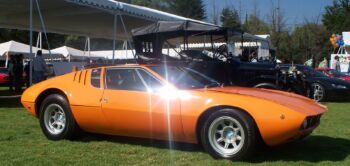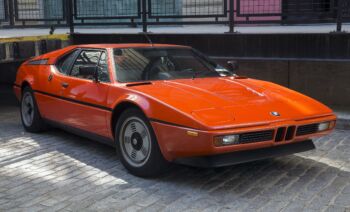Italian born Giorgetto Giugiaro is the designer who had the greatest influence on the modern automotive industry.

Image source: https://search.creativecommons.org/photos/a4854dc1-dd68-405a-9c3a-946ab6a28aa1 by SOCIALisBETTER
A Young Prodigy
He had his first contact with the automobile industry at the age of 17 when he was invited to join Centro Stile Fiat. Nuccio Bertone, another important Italian automobile designer, saw his sketches at the Turin Motor Show and immediately decided to lure in the talented young man. So Giugiaro, became the chief designer at one of Italy’s premiere design studios at the age of just 22. In six years Giugiaro created dozens of successful designs, including the Giulia Sprint GT, the Fiat 850, the Fiat Dino, the Chevrolet Corvair Testudo, the Alfa Romeo Canguro and the BMW 3200CS. If Bertone’s studio was the leader in Italian car design, it was also because of him. In the 1960s he designed with De Tomaso Automobili two of the most impactful design in the world’s automobile history: the De Tomaso Mangusta and the Maserati Ghibli. These models were characterized by a shark-shaped nose, a sloping roof line and a rather aggressive design.

Image source: https://en.wikipedia.org/wiki/File:DeTomaso_Mangusta.jpg Author:Gonzalo de Velasco

1978–1981
Image source:https://en.wikipedia.org/wiki/BMW_M1#/media/File:BMW_M1,_front_right_(Brooklyn).jpg
The Origami Period
Giugiaro’s company in Turin, Italdesign, designed Ducati motorcycles, razors, furniture, hair dryers, bathroom equipment, watches, weapons, cameras and so on. Italdesign was leading the scene because it created both design and prototypes and provided engineering and testing services. Moreover, Giugiaro had a distinctive and unconventional design method: he used to come up with a basic idea very quickly and the design was directly tested in the wind tunnel.
Image source: https://en.wikipedia.org/wiki/File:VW_Golf_I_Facelift_front_20081209.jpg Author:Rudolf Stricker
The Wedge Era in car design was characterized by angular aesthetic, such as the world-famous Lamborghini Countach, and Giugiaro pioneered this technique with his “origami period“. He grabbed the attention with the Lotus Esprit prototype, the Maserati Boomerang, the Alfa Romeo Iguana. To this period belongs the most important of the car conceived by Giugiaro, as he declared, the Volkswagen Golf.
Hanging Between Movie Stars and Commodities
The origami style was applied for wildly different purposes and markets.
In fact, he designed the Lotus Esprit which became James Bond’s car in “The Spy Who Loved Me,” famously transforming into a submarine. The same car was purchased by Elon Musk for nearly $1 million. Another praised Giugiaro’s design adopted in a cult movie is the DMC DeLorean, picked as Marty McFly’s car for the trilogy “Back to the Future”. This wedge-shaped two-doors sports car with a stainless steel body with gullwing doors was based on the Porsche Tapiro. However, around the same time, he designed two opposite cars of the 1980s: the well-known Fiat Uno and the Panda. With rational and essential design, these models were conceived for the mass market. As Giugiaro said they were like “a pair of jeans: a simple, practical, no-frills piece of clothing.”

A Masterpiece: Maserati Ghibli Tipo AM115
In the mid of the 1960s Ferruccio Lamborghini had stolen a march on both Maserati and Ferrari, by unveiling the Miura at Geneva Show. Maserati asked Giugiaro to design a car to challenge that amazing design, and in response he created one of his masterpieces: the Maserati Ghibli Tipo AM115. Giugiaro’s “four torpedoes“, as were called later his designs for Ghia, moved from curves to straight lines in car design that would become the canon a decade later, in the “Wedge Era”. This masterpiece is a mixture of straight lines and curves, with the tops of the front wings which appears flat, but features a subtle reverse curve shape that accentuates the height of the wheels and the bonnet line. The same technique was applied on the sides of the roof and on the lip of the bootlid.

1967–1973
Image source: https://en.wikipedia.org/wiki/Maserati_Ghibli#/media/File:1967_Maserati_Ghibli_ORC3.jpg
Info sources:
https://edition.cnn.com/style/article/giorgetto-giugiaro-interview/index.html
https://drive-my.com/en/blogs/entry/maserati-ghibli-tipo-am115-collectors-guide.html

